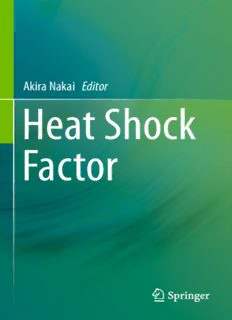
Heat Shock Factor PDF
Preview Heat Shock Factor
Akira Nakai Editor Heat Shock Factor Heat Shock Factor ThiSisaFMBlankPage Akira Nakai Editor Heat Shock Factor Editor AkiraNakai DepartmentofBiochemistryandMolecularBiology YamaguchiUniversitySchoolofMedicine Ube,Japan ISBN978-4-431-55850-7 ISBN978-4-431-55852-1 (eBook) DOI10.1007/978-4-431-55852-1 LibraryofCongressControlNumber:2015958662 SpringerTokyoHeidelbergNewYorkDordrechtLondon ©SpringerJapan2016 Thisworkissubjecttocopyright.AllrightsarereservedbythePublisher,whetherthewholeorpartof the material is concerned, specifically the rights of translation, reprinting, reuse of illustrations, recitation, broadcasting, reproduction on microfilms or in any other physical way, and transmission or information storage and retrieval, electronic adaptation, computer software, or by similar or dissimilarmethodologynowknownorhereafterdeveloped. The use of general descriptive names, registered names, trademarks, service marks, etc. in this publicationdoesnotimply,evenintheabsenceofaspecificstatement,thatsuchnamesareexempt fromtherelevantprotectivelawsandregulationsandthereforefreeforgeneraluse. Thepublisher,theauthorsandtheeditorsaresafetoassumethattheadviceandinformationinthis book are believed to be true and accurate at the date of publication. Neither the publisher nor the authors or the editors give a warranty, express or implied, with respect to the material contained hereinorforanyerrorsoromissionsthatmayhavebeenmade. Printedonacid-freepaper SpringerJapanKKispartofSpringerScience+BusinessMedia(www.springer.com) Preface All organisms sense varying conditions in the environment that they live in, and respond and ultimately adapt to them through sophisticated mechanisms. These adaptive mechanisms play pivotal roles for homeostasis and biological defense; therefore, the elucidation of the adaptive mechanisms has grown to be major researchfieldinmolecularbiology.Aprominentsystemamongthemisaprimitive and evolutionally conserved adaptive mechanism called heat shock response, which induces the heat shock proteins against proteotoxic stress including high temperature. Ithasbeen53yearssincethediscoveryoftheheatshockresponse(in1962),and 27yearsafterthemolecularcloningofthekeyregulator,heatshockfactor(HSF) (isolatedin1988).Thisadaptiveresponsetohightemperatureorproteinmisfolding is a fundamental mechanism to maintain the capacity of protein homeostasis, or proteostasis,andisevolutionallyconservedamongalllivingorganisms,including bacteria and humans, on the earth. Furthermore, physiological and pathological rolesofHSFhavebeenextensivelystudiedinfruitfly,worm,andmousemodelsfor the last 18 years (starting in 1997). It has been revealed that HSF plays roles in developmentofthebrain,reproductiveandsensoryorgans,andinageing,inflam- mation, and circadian rhythm. Analysis of the mechanisms have uncovered that HSFexertsawiderangeofeffectsongeneexpressionandepigeneticstatusonthe whole genome. Moreover, loss or gain of HSF function is also closely related to protein-misfoldingdiseasesincludingneurodegenerativediseases,psychiatricdis- eases,heartdiseases,andcancers.Therefore,HSFisnowthoughttobeapromising therapeutictargetfortreatmentoftheserefractorydiseases. Atthispoint(2015),weshouldbringalargeamountofHSF-relatedinformation, describe core observations about molecular mechanisms and pathophysiological roles, and provide fundamental concepts on the basis of information from diverse aspectsinonebook.Theaimofthispublicationistoprovidearesourceontheheat shock response and HSFfor undergraduatestudents. This book willnotonlybea guide of the heat shock response and HSF to be understandable to students and v vi Preface youngresearchersinotherfields,butwillalsobeacornerstoneforfutureworksin the field related to the heat shock response and HSF. I would like to take this opportunitytothankalltheauthorsfortheircontributionsandthestaffmembersat SpringerJapanfortheirenthusiasmandeffort. Yamaguchi,Japan AkiraNakai Contents PartI TheBasisofHSFBiology 1 ProteostasisandAdaptationtoHighTemperatureStress. . . . . . . . 3 AkiraNakai 2 StructureandFunctionoftheHSFFamilyMembers. . . . . . . . . . . 31 RyosukeTakiiandMitsuakiFujimoto 3 RegulationofHSFActivationandRepression. . . . . . . . . . . . . . . . 51 EiichiTakakiandAkiraNakai 4 TranscriptionalRegulationbyHSF. . . . . . . . . . . . . . . . . . . . . . . . 73 MitsuakiFujimoto PartII PhysiologicalRolesofHSF 5 HSF1RegulationinAgingandItsRoleinLongevity. . . . . . . . . . . 93 NettaShemeshandAnatBen-Zvi 6 HSFModulatesNeuralDevelopmentUnderNormalandStress Conditions. . . . . . . . . .. . . . . . . . . . . . . . .. . . . . . . . . . . . . . . .. . . 115 SeijiIshiiandKazueHashimoto-Torii 7 HSFMaintainsSensoryOrgans. . . . . . . . . . . . . . . . . . . . . . . . . . . 131 KazumaSugahara,KeTan,AkiraNakai,andHiroshiYamashita 8 HSFIsRequiredforGametogenesis. . . . . . . . . . . . . . . . . . . . . . . . 147 KojiShiraishi 9 HSFRegulatesImmuneandInflammatoryResponse. . . . . . . . . . . 165 SachiyeInouye 10 HeatShockFactorsModulateCircadianRhythms. . . . . . . . . . . . . 197 TsuyoshiHirotaandYoshitakaFukada vii viii Contents PartIII DiseasesAssociatedwithHSFFunction 11 HSFInhibitstheProgressionofAge-RelatedNeurodegenerative Diseases. . . .. . . . . . . . . . . . . . . . . .. . . . . . . . . . . . . . . . . . .. . . . . 213 NaohideKondo,MasahisaKatsuno,YuichiRiku,andGenSobue 12 HSFandHeartDiseases. . . . . . . . . . . . . . . . . . . . . . . . . . . . . . . . . 243 JieYuanandYunzengZou 13 HSFSupportsCancer. . . . . . . . . . . . . . . . . . . . . . . . . . . . . . . . . . . 261 MakotoChuma 14 HSF1ActivationbySmallChemicalCompoundsfor theTreatmentofNeurodegenerativeDiseases. . . . .. . . . . . . . . . .. 277 NobuhiroFujikake,ToshihideTakeuchi,andYoshitakaNagai Index. . . . . . . . . . . . . . . . . . . . . . . . . . . . . . . . . . . . . . . . . . . . . . . . . . . 293 Part I The Basis of HSF Biology
Description: